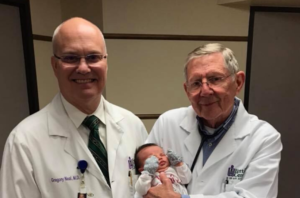Discover your path to parenthood today.
Male Factor Infertility Accounts for Nearly 30 Percent of All Infertility Cases
There are many conditions that may cause a man to become infertile, and the specialists at the Fertility Center of San Antonio can diagnose and treat the causes of infertility so that a man can conceive a child. Despite the common belief that infertility is caused by a female factor, in reality, there is a 30-40 percent risk of male factors as well.
For many men, being unable to father a child may impact self-esteem, confidence, and more. Our team understands the important role that fertility plays in a man’s sense of masculinity, and we work diligently to not only identify the causes of fertility issues but also to overcome them. To learn more about male factor infertility, contact our fertility center in San Antonio, TX, today to schedule your consultation.

What is Male Factor Infertility?
Male factor infertility involves essentially any factor that affects the male partner’s ability to reproduce. Causes of male factor infertility are typically related to either the production or obstruction of sperm. Many factors can result in either reduced sperm production or an obstruction that inhibits the delivery of the sperm.
When the male reproductive system is functioning properly, 20 million or more sperm per milliliter of semen travel from the testes through the contracting vas deferens, pushing the sperm toward the base of the penis, where the prostate gland and seminal vesicles release secretions to produce semen. The muscles then contract to force the sperm-carrying semen out in bursts and into the vagina.
Causes of Male Infertility
Sperm Production Issues
Some men have a below-average sperm count, which may be associated with any of the following:
- Varicocele, or dilated veins, prevent proper cooling of the testicles, reducing sperm count and motility. Varicocele affects roughly 40 percent of men suffering from infertility.
- An undescended testicle, which is exposed to higher internal body temperatures and can significantly impact sperm production.
- Testicular disorders and hormonal imbalances. However, you should avoid testosterone treatment, which can further hinder your fertility.
- Genetic variations, resulting in irregularly developed testicles and reduced sperm production.
- Various infections, including sexually transmitted diseases (STDs), which affect sperm production and motility. Recurring infections such as chlamydia can eventually cause scarring that inhibits sperm motility.
We will work diligently to help you overcome your infertility struggles so that you and your partner can start a family.
Sperm Delivery Issues
Factors that can affect the delivery of sperm include:
- Sexual issues, which are often treatable, including erectile dysfunction (ED), improper technique, or pain during intercourse.
- Retrograde ejaculation, a condition in which semen enters the bladder rather than coming out of the penis. This condition is usually caused by another condition such as diabetes, or certain surgeries involving the bladder, prostate, or urethra.
- A blockage in certain areas of the testicles or ejaculatory ducts, typically present at birth, which can inhibit sperm motility.
- Some men do not produce ejaculate (semen), which delivers the sperm. This is most common in men who have suffered spinal cord injuries or certain diseases.
Environmental Factors
In addition to the above factors, environmental factors can also contribute to male infertility. These may include excessive consumption of alcohol or other substance abuse, smoking tobacco, obesity, emotional stress, excessive exposure to heat, and exposure to pesticides or other chemicals.
Diseases that can impact male fertility include diabetes, thyroid disease, and reproductive cancers. In addition, cancer treatments such as chemotherapy can attack healthy cells including sperm, significantly reducing sperm production. Fortunately, our expert team understands how to successfully treat these issues.
The Emotional Impact of Infertility
Men suffering from some form of infertility may grapple with self-esteem issues because they are unable to conceive. This distress can significantly impact a man’s personal and professional relationships, and lead to depression, anxiety, and sexual dysfunction.
At the Fertility Center of San Antonio, our highly trained team of specialists can help you determine the causes of infertility and then recommend necessary treatments to improve your odds of conception. Our team provides more than just medical assistance; we also provide couples the emotional support and compassion they need during this difficult time.
Contact Us
At the Fertility Center of San Antonio, we will work diligently to help you overcome your infertility struggles so that you and your partner can start a family.
Contact our office today to schedule your consultation with one of our specialists and learn more about all of the innovative technologies we can utilize to help men become reproductively sound.











